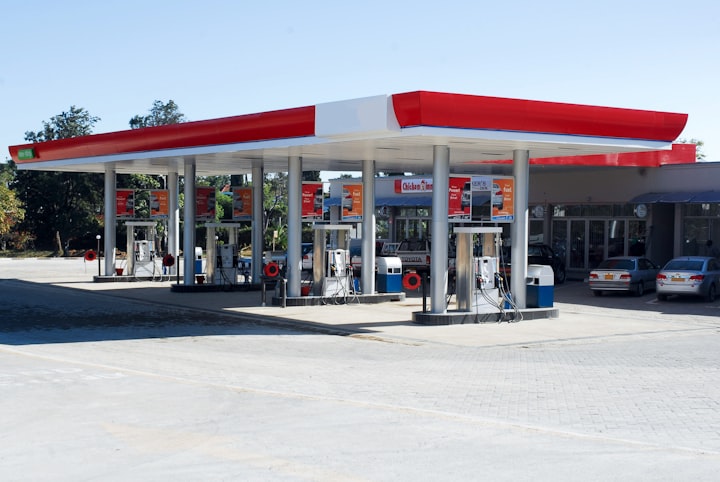Embracing Change
A Local Man's Journey in Nigeria's Fuel Subsidy Removal.

In the bustling city of Lagos, Nigeria, lived a local man named Ade. Ade had spent most of his life navigating the challenges of a developing country, where the cost of living was already a daily struggle. However, everything changed when the government decided to remove fuel subsidies, causing a drastic increase in the prices of commodities. Ade found himself facing an uncertain future, but he was determined to find a way to survive.
As the news of the subsidy removal spread like wildfire, panic gripped the city. Long queues formed at the few gas stations still operating, and transportation costs skyrocketed overnight. Ade, a hardworking individual with a small grocery shop, realized that his business would be directly affected by this new development. The price of transporting goods had tripled, and as a result, the prices of essential commodities soared.
Staring at his empty shop shelves, Ade knew he had to adapt swiftly to the changing circumstances. He brainstormed different ideas and strategies, seeking a way to overcome this sudden hardship. After careful consideration, he decided to take a leap of faith by transforming his small grocery shop into a community-centered cooperative.
Ade began reaching out to other local business owners in his neighborhood, sharing his vision of pooling resources to create a self-sustaining ecosystem. Together, they formed a cooperative where each member contributed in their unique ways. Ade's grocery shop became a hub for locally produced goods, allowing farmers, artisans, and craftsmen to showcase their products. By eliminating the middlemen and reducing transportation costs, Ade was able to keep the prices of essential commodities affordable for his community.
Word quickly spread about Ade's cooperative, and people from all over the city started flocking to his shop. The cooperative provided a platform for farmers to sell their produce directly, cutting out the need for intermediaries who often drove up prices. Ade also began organizing workshops to teach basic business skills to local entrepreneurs, empowering them to thrive in the challenging economic climate.
However, challenges were inevitable. Ade faced resistance from those who had previously monopolized the market. They saw the cooperative as a threat to their profits and did everything in their power to undermine Ade's efforts. But Ade remained steadfast in his determination, rallying his community together and standing up against those who sought to exploit the situation.
The cooperative's success caught the attention of non-governmental organizations (NGOs) and philanthropists who recognized the importance of supporting grassroots initiatives in such challenging times. Ade secured partnerships and funding, allowing the cooperative to expand and reach even more people. With the help of technology, Ade established an online platform for the cooperative, enabling customers to order goods and have them delivered to their homes, reducing transportation costs and making the cooperative accessible to a wider audience.
Ade's initiative not only helped the community overcome the challenges brought on by the fuel subsidy removal but also paved the way for long-lasting change. The cooperative served as an example of how communities could come together, support one another, and thrive in the face of adversity.
Over time, the government began to take notice of the cooperative's impact, and policymakers started considering ways to alleviate the burden on the common man. Subsequently, the government initiated programs to support local businesses and create a more favorable economic environment. Ade and his cooperative became influential advocates for change, actively participating in dialogues with policymakers and sharing their insights and experiences.
As the years passed, the economy gradually stabilized, and the prices of commodities became more manageable. Ade's cooperative continued to flourish, empowering individuals and transforming lives.
seen opportunities for growth and prosperity. The cooperative became a symbol of resilience and unity, inspiring other communities across the nation to replicate Ade's model of collective empowerment.
Recognizing the impact of Ade's cooperative, the government implemented policies to support local businesses and alleviate the burden on the common man. They reinstated subsidies on certain essential commodities, ensuring their affordability for the citizens. Additionally, the government invested in infrastructure development, improving transportation systems and reducing logistical challenges faced by businesses.
Ade's transformation from a local man struggling in the face of adversity to a respected community leader did not go unnoticed. He was invited to share his experiences and insights at conferences and seminars, both nationally and internationally. Ade became a champion for grassroots initiatives, advocating for inclusive economic policies that prioritize the welfare of ordinary citizens.
In his personal life, Ade's journey had a profound impact. His determination and resilience inspired his children, who had witnessed their father's unwavering spirit in the face of hardship. They pursued their education with renewed vigor, recognizing the power of knowledge and innovation to create positive change. Ade's cooperative also provided employment opportunities for many young individuals, enabling them to build a brighter future for themselves and their families.
As Ade reflected on his journey, he realized that the removal of fuel subsidies had been a catalyst for transformation. It had forced individuals and communities to come together, think creatively, and find sustainable solutions. The hardships they faced had sparked a sense of collective responsibility and a drive to create a better future.
Ade's story became a source of inspiration and hope for others facing similar challenges. His journey demonstrated that even in the face of adversity, there are opportunities for growth and positive change. It reminded people that by embracing change, harnessing their collective strengths, and fostering community spirit, they could overcome seemingly insurmountable obstacles.
In the end, Ade's cooperative not only weathered the storm caused by the removal of fuel subsidies but thrived and transformed countless lives. The cooperative became a testament to the resilience and determination of the Nigerian people, proving that with unity, innovation, and a steadfast belief in a brighter future, no obstacle is too great to overcome. Ade's story became woven into the fabric of his community, reminding them that they possessed the power to shape their destiny, no matter the circumstances.





Comments
There are no comments for this story
Be the first to respond and start the conversation.